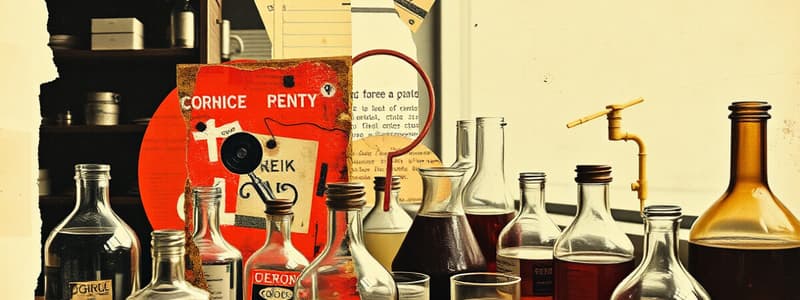Podcast
Questions and Answers
What should you do when carrying knives or sharp instruments in the laboratory?
What should you do when carrying knives or sharp instruments in the laboratory?
- Carry them with tips pointing down and away. (correct)
- Pass them hand-to-hand without caution.
- Point the tips toward you for better control.
- Keep them hidden in your bag until needed.
Where should chemical waste be disposed of in the laboratory?
Where should chemical waste be disposed of in the laboratory?
- In the sink drains if mixed properly.
- In regular trash bins for safety.
- In designated waste containers. (correct)
- In the fume hood for evaporation.
What should you do if you observe unsafe conditions in the laboratory?
What should you do if you observe unsafe conditions in the laboratory?
- Wait until the end of the class to report.
- Notify the instructor immediately. (correct)
- Try to resolve the issue yourself.
- Ignore them if you are not directly affected.
What is required before participating in laboratory activities?
What is required before participating in laboratory activities?
What is the rule regarding personal protective equipment in the laboratory?
What is the rule regarding personal protective equipment in the laboratory?
What must students do with their long hair during laboratory activities?
What must students do with their long hair during laboratory activities?
What is the proper protocol if a chemical splashes in your eye?
What is the proper protocol if a chemical splashes in your eye?
What should students do if they are unsure about a laboratory procedure?
What should students do if they are unsure about a laboratory procedure?
Which of the following actions is prohibited in the laboratory?
Which of the following actions is prohibited in the laboratory?
What should be done with broken glassware in the laboratory?
What should be done with broken glassware in the laboratory?
Flashcards are hidden until you start studying
Study Notes
Safety Equipment and Protocols
- Familiarize yourself with the locations of safety equipment: first aid kit, eyewash station, safety shower, fire extinguisher, and fire blanket.
- Know how to operate all safety equipment; it is essential for responding to emergencies.
- Always handle knives and sharp instruments with tips pointing down and away from the body; cut away from yourself.
- Never attempt to catch falling sharp instruments; grasp only by the handles.
Laboratory Environment
- Work in a well-ventilated area; use fume hoods when dealing with volatile substances or poisonous vapors.
- Avoid placing your head inside fume hoods during operations to prevent inhalation of hazardous fumes.
Personal Conduct and Dress Code
- Conduct yourself responsibly at all times in the lab; stay alert and cautious.
- Long hair must be tied back, and dangling jewelry should be secured to avoid hazards.
- Wear proper footwear that fully covers the foot; no sandals allowed.
- Laboratory aprons should be worn during activities to protect clothing and skin from spills.
Chemical Handling and Disposal
- Dispose of chemical waste properly; only designated substances can go down the sink.
- Solid chemicals and insoluble materials must be disposed of in the designated waste containers.
General Laboratory Rules
- Read and follow all written and verbal instructions carefully; seek clarification if needed.
- Never work alone; a teacher must be present.
- Do not touch equipment or materials upon entering the lab until instructed.
Accidents and Emergencies
- Immediately report any accidents or injuries to the instructor, regardless of how minor they may seem.
- Initiate a "Code one" call if you or a partner are injured to alert the instructor.
- For chemical splashes in eyes or on skin, flush with running water from the eyewash station or safety shower for at least 20 minutes.
Experimentation Guidelines
- Perform only experiments authorized by the instructor; unauthorized experiments are strictly prohibited.
- Monitor experiments personally and remain at your assigned laboratory station during procedures.
- Clean all work surfaces and apparatus at the end of experiments, returning equipment in working order to storage.
Medical Considerations
- Check with a physician regarding participation in lab activities if you have medical conditions such as allergies or pregnancy.
- Contact lenses are prohibited unless authorized by the instructor.
Studying That Suits You
Use AI to generate personalized quizzes and flashcards to suit your learning preferences.




